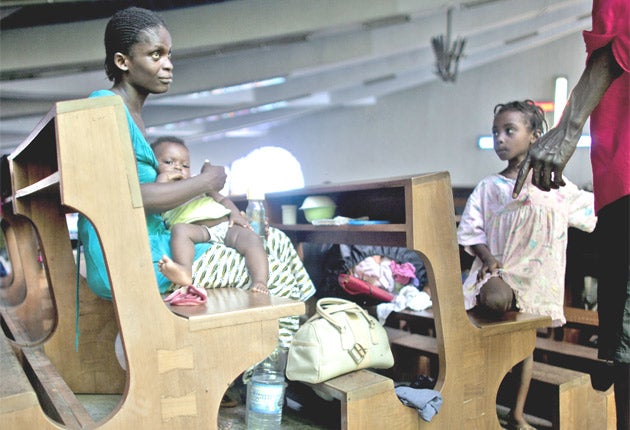Abandoned and thirsty, refugees at Abidjan's cathedral face uncertain future

Abidjan's cathedral rises like a white harp from the hillside above the city's lagoon. While fighting raged all around it for the past fortnight in the Plateau district more than 2,400 people sheltered inside.
Now the war is supposed to be over but most of the refugees have chosen to remain. There has been no water for two weeks and almost no food either. Wounded people lie untreated and the old and sick are without medicine.
Father Jean Baptiste Akwadan is surprised that there hasn't been more help: "There's been nothing from the government or international agencies," he says. No one apart from the Red Cross has reached them. So many people poured into the grounds of St Paul's that he opened the cathedral itself so that people could shelter inside. The beautiful stained-glass windows cast an array of colours across rolled-up sleeping mats and pews full of hungry, scared women and children.
A modernist complex stretched across the Plateau hillside, St Paul's was "right at the centre of the aerial battle," Father Jean says. It is overlooked by skyscrapers with blasted-out windows and surrounded by deserted streets.
The foul smell of makeshift latrines comes from the cathedral's leafy gardens. The desperate conditions are a world away from the order and security of the French army camp where a similar number of evacuees with foreign passports are being looked after.
Among the tired multitude – many of whom are still in the same clothes they fled in – are refugees who give the lie to any notion that this was a religious war between the Muslim north and the Christian south. Toure Bakari had come south to the commercial capital two weeks ago to collect his teacher's back-pay when he was caught in the conflict. A Muslim from the central Ivorian village of Daoukro, he wasn't very sure where else to go.
"If it was a religious war I wouldn't be here," said the gaunt-looking father of five children. "When I first got here I would pray around the back in secret, I wasn't sure if people would beat me or kill me."
Now he's more worried about food than religious tensions and prays with the other Muslims in the open.
"This war had nothing to do with religion," Father Jean believes. "I'm a Catholic and I'm from the north."
He calls Ivory Coast's new, northern and Muslim President Alassane Ouattara an "intelligent man" whom he hopes will keep all the promises that he was making yesterday to bring peace and stability to the divided country.
He points to Mr Ouattara's Catholic wife as showing evidence of the President's pluralism. But away from the priest's optimism deep currents of anger run among the refugees. The French media are hated by many and white faces quickly draw a furious mob. Among the refugees are scores of soldiers still loyal to ex- president Laurent Gbagbo. The priests in the complex insisted no one could enter with a gun but many fighters have shed uniforms and weapons to hide inside. Michael Oue was a Republican Guard in the Plateau army camp a few city blocks away and took part in street fighting.
He took off his army uniform and came to the Cathedral on Monday. The 25-year-old is furious with the French. "They killed 104 soldiers in one night at my camp. Afterwards our chief told us to take off our uniforms and hide," Mr Oue said.
He accuses the French of "kidnapping" his president, Mr Gbagbo. A priest near by says that the French forces bombed the cathedral itself and shows a hole in the ceiling where concrete and debris rained down upon sleeping children. Two students join the conversation, one of them pulling out his identification card.
"Right now the rebels [forces loyal to Mr Ouattara] are stopping young men and demanding their ID cards," he says. "If you are from the wrong ethnic group they will kill you immediately." He asks that his name not be given.
Amnesty International and Human Rights Watch have reported reprisal killings, both in Abidjan and the west of Ivory Coast by Ouattara forces. And yesterday morning new corpses had begun to appear on the streets.
The crisis has left this country lethally polarised. Agnes Yaba, a young woman from the war-torn neighbourhood of Abobo, gave birth among the Cathedral pews two days ago. She named her new son Paul, and he now faces an uncertain future.
Subscribe to Independent Premium to bookmark this article
Want to bookmark your favourite articles and stories to read or reference later? Start your Independent Premium subscription today.

Join our commenting forum
Join thought-provoking conversations, follow other Independent readers and see their replies